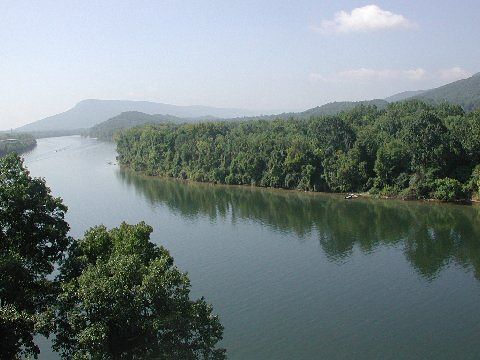|
 (2008)
Williams Island/ Samuel Williams farm (2008)
Williams Island/ Samuel Williams farm
At the time of the civil war, Samuel Williams was a wealthy plantation
owner whose landholdings included a large farm along the northern bank of
the Tennessee river and Williams Island (named after him). Following the
battle of Chickamauga, union troops occupied Williams's plantation and
island. Confederate Col. William C. Oats, commander 15th Alabama infantry,
stated October 1863 that Williams was living and farming on his island.
That same month Oats received help from Williams in a failed waterborne
foray against union forces camped on Williams Island. Williams suffered
considerable property loss during and after the civil war.
Just downstream from Moccasin Bend is Williams Island. This natural
treasure is owned by the State of Tennessee - Division of Archaeology, but
is managed by the Tennessee River Gorge Trust. Here, evidence of man
settling the area dates back to the 12,000 year range. However, the latest
evidence suggests that date could be as far back as 15,000 years ago.
These people were hunters and gatherers for the most part, but they also
grew crops. This fertile island has had agricultural activities off and on
throughout the years up to today. Farmers raise cattle here today and
certified organic farming takes place on a limited basis. The island has
reverted back to a naturally wooded state over much of the acreage, and
there is also a wetland on the island that is home to many native
amphibians as well as beavers. Without some carefully managed agriculture,
the island would become overgrown very quickly and it would be impossible
to continue archaeological research.
During the Civil War, one of the men who stole the locomotive "The
General" from Atlanta escaped custody from authorities in Chattanooga and
hid out on Williams Island until he was recaptured. |

